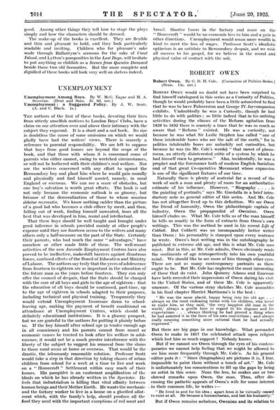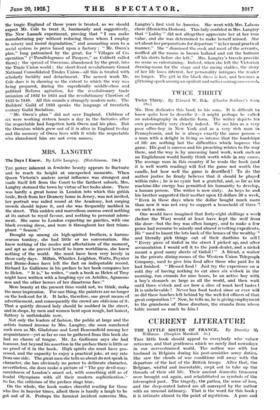ROBERT OWEN
ROBERT OWEN would no doubt not have been surprised to find himself catalogued in this series as a Curiosity of Politics, though he would probably have been a little astonished to find that he was to have Palmerston and George IV. for companion
exhibits. Undoubtedly he was a Curiosity, though he- had little to do with politics ; so little indeed that in his untiring activities during the climax of the Reform agitation from 1829 to 1832 there is scarcely a trace that he was so much as aware that " Reform " existed. He was a curiosity, not because he was what Sir Leslie Stephen has called " one of those intolerable bores who are the salt of the earth," for in
politics intolerable bores are unluckily not curiosities, but because he was (in Mr. Cole's words) that rarest of pheno- mena, an utterly disinterested critic of a system by which he had himself risen to greatness." Also, incidentally, he was a prophet and the forerunner both of modern English Socialism and of that great Co-operative Movement whose expansion is one of the significant features of our time.
Naturally there is plenty of material for a record of the work of such a man and plenty of room for an authoritative estimate of his influence. However, " Biography . . is the painting of portraits," says Mr. Guedalla in a brief intro- ductory note as general editor of this series. And Mr. Cole has not altogether lived up to this definition. We see Owen the friend of humanity, Owen the philanthropic captain of industry, Owen the propagandist of Owenism. Owen himself eludes us. What Mr. Cole tells us of the man himself
he tells us mostly in the form of extracts from Owen's own writings. This was the method he used in his recent Life of Cobbett. But Cobbett was an incomparably better writer than Owen ; his personality is stamped upon every Sentence he wrote. Owen's best writing was in the autobiography he published in extreme old age, and this is what Mr. Cole uses most. But in this, as Mr. Cole admits, Owen obviously reads the sentiments of age retrospectively into his own youthful mind. We should like to see more of him through other eyes. There are not as many contemporary portraits as there
ought to be. But Mr. Cole has neglected the most interesting of those that do exist. John Quincey Adams and Emerson have both recorded their impressions of Owen during his visit to the United States, and of these Mr. Cole is apparently unaware. Of the various stray sketches Mr. Cole assembles in his final chapter Harriet Martineau's is the best :
" He was the same placid, happy being into his old. age . . • always on the most endearing terms with his children, who loved to make him, as they said, ' the very happiest old man in the world,' always a gentle bore in regard to his dogmas and his expectations . . . always thinking he had proved a thing when he had asserted it in the force of his own convictions ; and always really meaning something more rational than he had actually expressed."
But there are big gaps in our knowledge. What persuaded Owen to make in 1817 the celebrated attack upon religion which lost him so much support ? Nobody knows.
But if we cannot see Owen through the eyes of his contem- poraries we cannot help feeling that we might be allowed to see him more frequently through Mr. Cole's. As his general editor puts it : Since (biographies) are' pictures it is, I fear, impossible to paint them without a touch of art." Mr. Cole is unfortunately too conscientious to fill up the gaps by being an artist in this sense. None the less, he makes one or two shrewd remarks upon Owen, the man. Thus, after dis- cussing the pathetic appeals of Owen's wife for some interest in their common life, he writes :—
" He lived in and for his idea ; apart from it he virtually ceased to exist at all. He became a humanitarian, and lost his humanity."
But if Owen remains nebulous, Owenism and its relation to
the tragic England of those years is treated, as we should expect Mr. Cole to treat it, luminously and suggestively. The New Lanark experiment, proving that " I can make manufacturing pay without reducing those whom I employ to misery and moral degradation," and amounting soon to a social system in parvo based upon a factory ; " Mr. Owen's plan," long patronized by the great, for " Villages of Co- operation" ("Parallelograms of Paupers," as Cobbett called them) ; the spread of Owenism, abandoned by the great, into the Trade Union world ; the short-lived revolutionary Grand National Consolidated Trades Union—all this is treated with scholarly lucidity and detachment. The newest work Mr. Cole does is in showing us the extent to which the way was ;being prepared, during the superficially middle-class and political Reform agitation, for the revolutionary trade unionism of 1832 to 1834 and the revolutionary Chartism of 11835 to 1848. All this sounds a strangely modern note. The Builders' Guild of 1833 speaks the language of twentieth century Guild Socialism.
" Mr. Owen's plan " did not save England. Children of ,six were working sixteen hours a day in the factories after the respectable had forgotten both Owen and his plan. But the Owenism which grew out of it is alive in England to-day and the memory of Owen lives with it while the respectable who abandoned him are not even names.











































 Previous page
Previous page